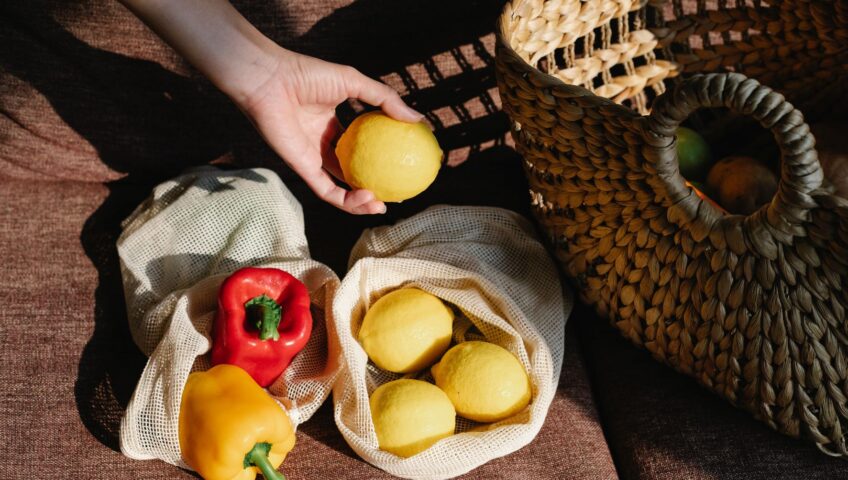
How to Live a Zero Waste Lifestyle
In the most recent study, it was estimated that UK households generated around 26 million tonnes of waste in 2019, 54% of which went to landfill sites. This waste contributes to the pollution of the air and water, affecting the eco-system and impacting climate change. A lot of waste ends up in the ocean, with plastic waste threatening marine life and, as a result, our health too.
There are easy steps we can all take to reduce the amount of rubbish we produce. Whilst living a zero waste lifestyle doesn’t happen immediately, changing some of your habits now can make a real difference.
Writer and activist Bea Johnson put forward the below five principles of living a zero waste lifestyle:
- Refuse what you don’t need
- Reduce what you do use
- Reuse what you can
- Recycle where possible
- Rot what’s left
By implementing these five principles, you can start working towards living more sustainably. Below are some habits that you can change today for a zero waste lifestyle.
Food Shopping
When you go shopping, make sure to take reusable bags. If you already have a stash of plastic bags in the house, make sure to take them with you when you next go shopping. If you don’t already have bags you can use, you can buy reusable fabric bags – try to make sure they’re from a sustainable source.
Lots of food will be wrapped in plastic. Where possible, buy loose fruit and veg and use a reusable produce bag, rather than buying pre-packaged food. If it’s available to you, use the deli, fishmonger and butchers to buy your produce, or shop at a local farmers’ market.
Clothes
You will have probably already heard about the damage fast-fashion is doing to the environment, as well as the human impact. Do your research before you purchase and buy clothes from companies that have extensive sustainability policies.
The best way to shop sustainably is to buy second-hand and vintage clothes, as these items are already in the waste stream. You should avoid shopping online if possible – clothes will often be delivered in a lot of plastic packaging. Shopping locally will also reduce the carbon footprint of your clothes’ journey.
Don’t just throw out your clothes if they have a small rip or tear. Clothes that might be damaged can often easily be fixed. This can greatly extend the lifespan of your item and mean you don’t need to buy something new.
In the Kitchen
An easy way to reduce food waste is to compost what you can. If you don’t have a garden, you can get an indoor compost system. Some local authorities will pick up food waste as they do with other household waste and recycling. If not, you might have a place in the area that you can drop your compost off at, who can make use of it.
Rather than buying plastic food containers to store your leftovers, look for stainless steel or glass. Think about what you might already have in the kitchen – if you have bought food in glass jars, you can wash and reuse the container once the contents have been used. Plan your meals in advance and make sure to use up your leftovers so they don’t go to waste.
You can also purchase reusable silicone bags rather than single-use food bags and reusable waxed fabric food wrap to use instead of cling film or foil. Make sure to use up what you already have in the cupboards before buying something new.
In the Bathroom
If you can, buy your toiletries, like shampoo, conditioner, and shower gel, in bulk. You can get glass containers to decant bigger bottles into, so they’re still handy and accessible. Alternatively, you can now buy a lot of toiletries in bar format. This massively reduces the plastic waste, sometimes eliminating it completely, depending on where you buy it.
Many personal care products are made of plastic. However, there are usually more sustainable alternatives available. You can get a bamboo toothbrush to replace your plastic one. You can also get stainless steel safety razors instead of plastic. Many companies will also organise recycling of razor heads, so they don’t end up in landfill.
On the Go
If you’re leaving the house, make sure to always take a reusable coffee cup, bamboo cutlery, a metal straw, reusable water bottle and reusable bags. This way you’ll be prepared for any eventuality and should be able to avoid having to use anything that will go straight in the bin when you’re out and about.
Prepare your food where you can before you go out. If you want or need to buy food when you’re out, look for establishments which sell food in sustainable, recyclable, or compostable packaging.
Away With It knows how important it is to live sustainably. That’s why we reuse or recycle, on average, 95% of the waste that we collect. Good quality items are donated to charity and the rest is disposed of in the most environmentally friendly manner possible. Contact us today to get a quote for our eco-friendly waste recycling service.


